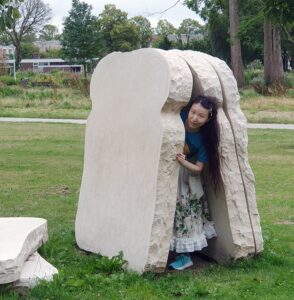The ringmaster thinks about the words work and pride and feels nothing.
Glowing tubes writhe and pulse through colours as they pass over the audience, who scream or laugh or noiselessly gape up into their futures. One tube pauses above the ringmaster, changing to match the black and purple of his tailcoat, soothsaying nothing at all.
◊ ◊ ◊
Deev hasn’t yet visited the carnival, although it’s been weeks since the oil cloths and painted boards tumbled out of trucks and shook themselves out.
“There’s no artistry. No meaning,” her aunt says. She predicts Deev will return with a report of her purse—a semi-new one from the aunt—stolen or her person groped. They go to a harmless pantomime featuring the town’s expats. Deev’s other aunt says this aunt lives very comfortably, although this aunt says she is poor but willing to spend money on their sister’s child.
At the pantomime they sit in the cheapest seats, one behind the other. Deev has to sit in front. The man in front of her leans back against her knees, and when she struggles, he leans forward to throw his weight back harder. During the show she holds her breath and holds one shoulder stiff beneath her aunt’s hand; after the show her aunt scolds her for her posture.
◊ ◊ ◊
The dark mass in the great tent stirs. Backstage, the ringmaster commands workers who lift long translucent silver tubes from black-painted boxes.
“Don’t drop them.” He makes a sound that might be air moving in or out through his teeth. “Don’t rush. This is expensive equipment, unlike your heads.”
The workers finish setup and leave. The ringmaster kneels before a set of switches, his hands hovering, not touching.
◊ ◊ ◊
Deev gives her weight to each part of the gate she touches, coaxing it to stay quiet. Shadows longer than the gate lash across her shoulders, lose their grip, and fall behind, reaching like her aunt’s green-veined, emerald-ringed hands. She sprints. She tears her shadow off the property.
First the ticket, then a fried banana. She breathes in sweet fruit and rancid oil. She watches others play games. Good will flows from passers-by, even those losing more than the worth of the prizes. At this time on another day, she might be sitting before the bathroom mirror while her aunt trims her hair to the correct length for a tight ponytail.
I only criticise you because you’re worth it. Her aunt’s hair is loose but clipped short and as glossy as a helmet. Other people say you look nice, because they don’t care if you never improve.
Deev raises a paper napkin to her oily lips, then stops herself.
◊ ◊ ◊
Lifted dripping from the tanks, the tubes bloom with pollen clouds. Pigment clouds. Full charge, the ringmaster says over their humming. They release uneven waves of bluish light as he slashes the air with arms stiff at the wrists. The tubes move through the air for a full hour—the performance length consistent, if the quality is not. Too many complained about their fortunes at the last town, where the ringmaster laughed them out of his office. Don’t come to me with complaints about aesthetics and bad dreams, he says. They’re tubes. They make fun shapes and colours. It’s on you if you don’t like what you read into them.
The tubes lift themselves off the ground. One slinks over him and towards a worker paused in work.
“Less than half the brains of these things,” the ringmaster says.
The workers avoid eye contact.
They and their electric circus are out of vogue; much rests on their shows here, the largest town this season—the previous barely had a school or fire station. If the workers don’t push themselves harder and show him more respect, he’ll… he’ll cite financial reasons and let them go. “Too bad, so sad,” he says to no one. “Anyone and anything can be replaced.”
None pay attention to him in the audience. Deev cranks her head back until her face is perpendicular to the ground. Above her, the tubes connect and break apart, twist and elongate, forming shifting pictures that never complete. Metal can’t move like this. The humming drowns out half her thoughts. The air snaps. Maybe it’s high-tech metal. Light spills out of any two tubes that meet and reflect off the silver lining of the tent, filling the space with light. In parts it leaves what look like scorch marks or tarnish.
Deev wonders if the tubes leak electricity. How furious her aunt would be if Deev burns to ash with a loud, dirty crowd in a circus tent.
The ringmaster mock-conducts a symphony. I’m an actor, not a technician, he likes to say. The world’s full of nobodies with science or business degrees. People who need rules and guides. This is not that. This is art, and I’m, I’m—
A succession of bright shapes burns itself into unblinking eyes, leaving shadows for seers to puzzle or agonise or delight over in the days to come.
◊ ◊ ◊
The crowd leaves, rubbing their eyes and necks. Some speak of other (better, they hint) circuses. The ringmaster doesn’t hear. He remains bent for effect, though in one interview he calls it a moment to process my art. His shadow fades as tubes descend around him.
Workers mill in and pick up the drained tubes. One slinks through a worker’s large hands. The ringmaster twists around and rushes at the man.
“Waste of space! You fucking break my equipment? You—”
The worker backs up, but other tubes block his path. He thrust his forearms against the ringmaster’s slaps.
One of his colleagues gently pulls the ringmaster back.
“Easy. Easy on him.”
The moment passes; the ringmaster waves or salutes the air and leaves. No one looks at the worker. He and the others are already concentrating on returning the tubes to the dark.
◊ ◊ ◊
The ringmaster sits by a row of open containers. He runs a hand across a metallic body, seeking the energy within. Even when he closes his eyes, his hard fingertips do not feel warmth.
◊ ◊ ◊
Deev saw love in the air. Probably. She’s no expert at deciphering tubes, but isn’t that what fortune-telling always means for girls and women, whether the teller uses tarot cards or crystals or stars? At least the tubes don’t form the same vague shapes above everyone’s heads. She would like to have seen more about her future. She’d also like to have seen exotic animals, but in the last tent someone with beautiful body art—inkings, piercings, expandings—saw her and stared back harder and—
◊ ◊ ◊
On the last night she comes with long strides in the night. The circus smells familiar now. The eyes of the person in the last tent look familiar now. They sit facing each other. The person with body art takes Deev’s hand and brushes it against something coarse in a dark glass case. Snakeskin? No, snakeskin is… She keeps her fingers supple, not limp, in their hand.
“I still haven’t seen clowns.”
“This circus doesn’t have clowns.”
“Why not.”
“Clowns are not fun. They are sad. No one is coming to a circus for more sad.”
This person’s tent is painted with silver suns and emotionless eyes. This person contorts as they arrange props, nail in mouth, then looks back with a certain expression, as if reading Deev’s future and past in the simplest words.
◊ ◊ ◊
On the circus’s last night in town the electric tent remains shut. The tubes rest. A new ringmaster is on the way. The replacement promises to function without hyperfixating on the wrong things and to interact better with others. Externally it differs little from its predecessor, save for finer joints and padded fingertips. Better for lifting tubes from their feeding tanks. Better for guiding those costly, sensitive creatures when they dance.
The circus is leaving but Deev leaves first. She passes a multitude of voices. Ring toss. Ostrich burgers. Come up and take a spin, my darling. Five for three, just for you. She imagines these are jeers, imagines they are warmth. The sky looks unevenly dark, but perhaps it’s the imprints of light on her retinas. She stumbles a little.
She reaches the gate of the house and leans on it to remove a shoe. Fragments of popcorn or rock tumble out. She bends down to see if they’re lost in the grass. If they enter the house her aunt will sense and remove them. Outside they remain hers.
Deev locks the bathroom door against her aunt’s questions as they reshape into commands and threats. She drips water from the tap onto something coarse. She raises it to one cheek, then stops. A sigh loosens itself from her mouth. She stares at the lines and shapes around her features, radiating in streaks of expensive colour—bronze, amethyst, ruby, diamond dust. Her smile widens to leave its outlines, more grotesque than anything at the circus. She savours the spectacle with her eyes.
 Monica Wang has writing in Electric Lit, The Malahat Review, Banshee, and EVENT. In 2022 she was shortlisted for the W&A Working-Class Writers’ Prize while completing a writing MA at the University of Exeter. Born in Taichung, Taiwan, she grew up in Taipei and Vancouver, and is currently drifting in Europe.
Monica Wang has writing in Electric Lit, The Malahat Review, Banshee, and EVENT. In 2022 she was shortlisted for the W&A Working-Class Writers’ Prize while completing a writing MA at the University of Exeter. Born in Taichung, Taiwan, she grew up in Taipei and Vancouver, and is currently drifting in Europe.






